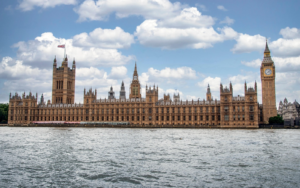What Can The Tech Sector Expect Under Labour?

It has been 5 weeks since the landslide victory of the Labour Party in the 2024 election, who now lead the UK with a significant majority in the House of Commons. For the next 4 years, at least, the Labour government’s vision for tech will have a key influence on the sector.
Over the last 14 years, the tech sector has seen boom and bust. From Brexit and the Covid-19 pandemic, to IR35 reforms, skill shortages and the recession. The past few years have rocked the sector. The Labour party’s main slogan for their election campaign was “Change”. The Labour Manifesto placed technology as a vehicle to grow the economy, upgrade the NHS and protect the UK from cyber-attacks.
So, after just over one month in government, what has the Labour government promised and acted upon for the tech sector so far?
Our Labour Government and Tech
AI
The biggest news to hit the tech sector since the election win was the announcement of £1.3 billion of funding for AI projects being shelved by the government. The money was unveiled last year under the previous government. However, the new Department for Science, Innovation and Technology has made the decision to remove this promised funding, due to the budget never being allocated. Specifics of this funding had included £500m for the AI Research Resource and £800m for the creation of a supercomputer at Edinburgh University.
In other news, although funding has been cut and the rumoured AI bill hasn’t been announced as of yet, the government has hinted towards greater regulation of AI in the UK. For example, the King’s Speech mentioned “appropriate legislation to place requirements on those working to develop the most powerful artificial intelligence models…”. This was quite vague language and no official promises have been made so far. The government may consider taking inspiration from the EU’s AI Act, the first ever legal framework for AI which provides requirements and obligations for AI developers or deployers, or choose another way to regulate the emerging technology.
Data
Digital Information and Smart Data Bill
A confirmed bill to reach parliament featured in the King’s speech is the Digital Information and Smart Data Bill. This is a rejig of a previous Conservative bill which failed to be passed before Former Prime Minister Rishi Sunak announced the dissolution of Parliament.
The aims for the bill are to “enable new innovative uses of data to be safely developed and deployed … help scientists and researchers make more life enhancing discoveries by improving data laws…”.
One area rumoured to be in this bill, which has been hotly debated, is the possible introduction of Digital Verification Services. This would enable UK residents having digital verification to use as part of their proof of identity for right to work, rent and criminal record checks. Whilst there has been no confirmation that this will be part of the bill, there have been concerns from individuals and certain groups that this type of technology could make the UK population a perfect target for cyber attackers.
Data Centres
In their manifesto, the Labour government promised to remove barriers to the creation of new data centres, including in green belt areas. By classifying data centres as nationally significant infrastructure projects, normal planning permissions would not be applicable. This may help support the growth of AI and other digital transformation plans and could allow for more data centres to be approved by bypassing local council opposition.
National Data Library
Labour’s Manifesto also proposed a National Data Library. This National Data Library could bring together and centralise current government research programs. This could create a platform of high quality data for scientists and start-ups to use. Increased security and safeguards could protect this data while allowing it to be accessed by relevant professionals for key projects.
Cyber Security
The Cyber Security and Resilience Bill was another announcement included in the King’s Speech a few weeks ago. This bill will aim to, “further strengthen our defences-” and address the growing number of cyber-attacks in the UK.
So far, the bill has been predicted to expand regulations and increase reporting requirements, potentially as a mandate for businesses, in order to gain a clearer image of the cyber-attacks across the UK. It is also hoped that it may update the regulatory framework – Network and Information Security Regulations (NIS) 2018 – which is roundly understood to be outdated. Since 2018, there have been countless changes to the cyber security landscape, with new challenges and an increase in attacks, which many would argue necessitates new regulations.
Funding
Despite the cut in AI funding that was recently revealed, the government promised in their manifesto to get rid of shorter funding cycles for Research and Development (R&D) institutions that have previously only lasted for a few years. They promised to offer 10-year budgets and more stable funding for institutions at the “forefront of global innovation”. If this comes to fruition, this may allow for an increase in research and the potential for world-leading innovation.
Digital Assets
On July 30th, the Law Commission published a report for the government that recommended digital assets be included in personal property. The Labour government is considering the report but hasn’t indicated a response as of yet. However, if this is implemented it could count crypto-tokens and non-fungible tokens (NFTs) as part of personal property. This could give more credibility to these digital assets, allocating them the same rights given to personal property, and would allow courts to fully understand how to view the legal implications.
Digital Fraud
The Labour government has also set out plans to tackle online fraud. The Labour Manifesto pledged to “work with technology companies to stop their platforms being exploited by fraudsters.”. According to the Financial Times, this may include requiring tech businesses to reimburse victims of online fraud, instead of banks. The aim of this could be to put even more pressure on tech companies to do more to combat fraud.
As Parliament isn’t due to reconvene until after the summer recess in September, we will not see any updates on new laws and bills until then. However, as it stands, the Digital Information and Smart Data Bill, along with the Cyber Security and Resilience Bill, are the only bills that have been announced, yet still bear very few details. Other areas that affect the tech sector workforce, such as the IR35 off-payroll working rule, have not been mentioned.
We have seen strong evidence that the economy is starting to show signs of growth. This includes the encouraging recent news that the Bank of England have cut the interest rates to 5%. For many businesses and professionals working in the tech sector, these are positive indicators that we are heading towards a more hopeful end to 2024 and a better 2025.
VIQU IT Recruitment is an award-winning IT specialist recruitment agency. If you have plans to grow your tech headcount and need expert help and advice to secure top talent, get in touch with our team here.
Similar articles you might like...

Forgoing Using Contract Cloud Migration Specialists: Benefits Vs Drawbacks
Cloud migration specialists are vital professionals but tight budgets are making companies consider alternative ways to deliver projects.

How Government Support Aims To Boost The UK’s Cyber Security Sector
The UK's cyber security sector has seen significant investment from the Government over the past decade, with the hopes to protect the UK against rising cyber threats.
Latest jobs
Full Stack Developer
 Glenrothes, United Kingdom
Glenrothes, United Kingdom
 £40k - 50k per year + Bonus
£40k - 50k per year + Bonus
Full Stack DeveloperSalary: £40,000 - £50,000 per annum plus bonusGlenrothes, Scotland (Full time on site)VIQU have partnered with a leading organisation who are looking to recruit a full stack developer join their development team. The...
Site Supervisor
 Stone, United Kingdom
Stone, United Kingdom
 Market related
Market related
Job Title: Site Supervisor Location: Stone (on-site)- must have full UK Driving License. Salary: market- relatedVIQU has partnered with a top engineering company seeking a Site Supervisor to create and manage project plans. The...
Site Manager - Nuclear Division
 Staffordshire, United Kingdom
Staffordshire, United Kingdom
 Competitive Salary
Competitive Salary
Site Manager - Nuclear Division - Competitive SalaryLocation: StaffordshireVIQU have partnered with a company that has been leading the charge in advanced system integration for decades. The Role:We're looking for an experienced Site Manager with strong...
Telephony Engineer
 Cardiff, United Kingdom
Cardiff, United Kingdom
 £35k - 45k per year
£35k - 45k per year
Telephony Engineer - 12 Month FTC – £35- £45,000 Location: Cardiff (Minimum 3 days on-site) Company: VIQU - Partnered with a Public Sector OrganisationVIQU is working with a Public Sector client to find an experienced...
Solution Architect
 London, United Kingdom
London, United Kingdom
 £650 - 750 per day + Inside IR35
£650 - 750 per day + Inside IR35
Solution Architect – Workplace Modernisation – 12 months ContractA Global Firm are at the start of a Workplace Modernisation programme of work and require a Solutions Architect to join the team and help design this...



